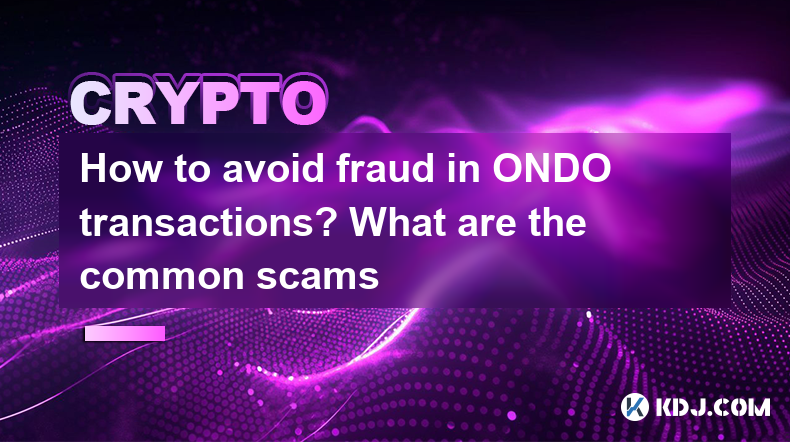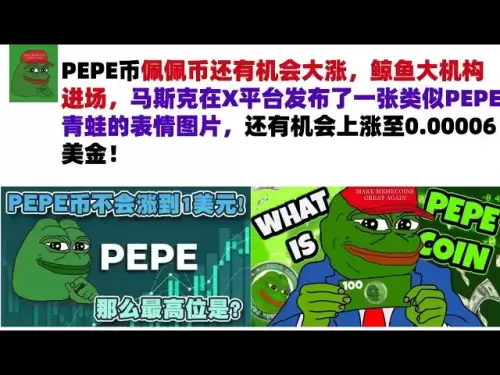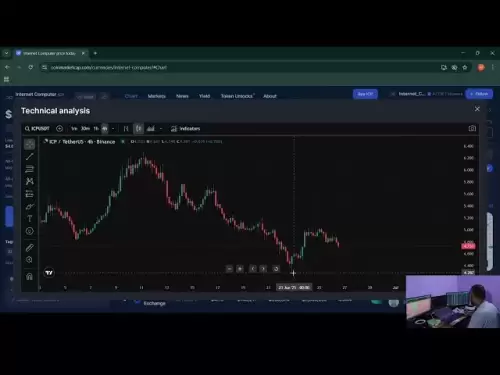-
 Bitcoin
Bitcoin $107,247.2038
-0.18% -
 Ethereum
Ethereum $2,424.7947
0.34% -
 Tether USDt
Tether USDt $1.0003
-0.02% -
 XRP
XRP $2.1171
-3.33% -
 BNB
BNB $645.6618
0.06% -
 Solana
Solana $141.5898
-1.32% -
 USDC
USDC $0.9998
0.00% -
 TRON
TRON $0.2710
-0.41% -
 Dogecoin
Dogecoin $0.1602
-2.99% -
 Cardano
Cardano $0.5553
-2.28% -
 Hyperliquid
Hyperliquid $36.3019
-2.42% -
 Bitcoin Cash
Bitcoin Cash $491.7212
2.04% -
 Chainlink
Chainlink $13.0810
-0.23% -
 Sui
Sui $2.6080
-5.06% -
 UNUS SED LEO
UNUS SED LEO $9.0040
-0.05% -
 Stellar
Stellar $0.2350
-3.06% -
 Avalanche
Avalanche $17.2294
-2.31% -
 Toncoin
Toncoin $2.8075
-1.05% -
 Shiba Inu
Shiba Inu $0.0...01121
-3.43% -
 Litecoin
Litecoin $84.2215
-0.32% -
 Hedera
Hedera $0.1429
-4.88% -
 Monero
Monero $312.2199
-0.90% -
 Dai
Dai $0.9997
-0.01% -
 Ethena USDe
Ethena USDe $0.9999
-0.02% -
 Polkadot
Polkadot $3.2973
-2.60% -
 Bitget Token
Bitget Token $4.4742
3.12% -
 Pi
Pi $0.5631
-10.10% -
 Uniswap
Uniswap $6.7817
-2.06% -
 Pepe
Pepe $0.0...09252
-3.74% -
 Aave
Aave $251.3830
-2.24%
How to avoid fraud in ONDO transactions? What are the common scams
To ensure safe ONDO transactions, use reputable platforms, enable 2FA, verify addresses, keep software updated, use strong passwords, and be wary of phishing attempts.
May 05, 2025 at 03:14 am

In the world of cryptocurrencies, ONDO transactions are not immune to fraud and scams. Understanding how to avoid these pitfalls and recognizing common scams can significantly enhance your security and peace of mind. This article will guide you through the best practices for ensuring safe ONDO transactions and highlight the most prevalent scams to watch out for.
Understanding ONDO Transactions
ONDO is a cryptocurrency that, like many others, operates on blockchain technology. This decentralized nature offers many benefits, but it also presents unique challenges, particularly in terms of security. When engaging in ONDO transactions, it's crucial to be aware of the potential risks and take proactive steps to protect yourself.
Best Practices for Safe ONDO Transactions
To ensure your ONDO transactions are secure, follow these best practices:
Use Reputable Wallets and Exchanges: Always use well-known and trusted platforms for storing and trading your ONDO. Research the reputation of the wallet or exchange before committing to it. Look for reviews, user experiences, and any reported security breaches.
Enable Two-Factor Authentication (2FA): This adds an extra layer of security to your accounts. By requiring a second form of verification, usually a code sent to your mobile device, 2FA makes it much harder for unauthorized users to access your funds.
Verify Recipient Addresses: Before sending ONDO, double-check the recipient's address. Cryptocurrency transactions are irreversible, so sending funds to the wrong address can result in permanent loss. Some wallets offer an option to save addresses, which can help reduce errors.
Keep Software Updated: Ensure that your wallet software, operating system, and any other related software are up to date. Updates often include security patches that protect against new vulnerabilities.
Use Strong Passwords: Create complex passwords for your accounts and change them regularly. Avoid using the same password across multiple platforms to minimize the risk of a single breach compromising multiple accounts.
Be Wary of Phishing Attempts: Scammers often use phishing emails or websites to trick users into revealing their private keys or login credentials. Always verify the authenticity of any communication purporting to be from a cryptocurrency platform.
Common Scams in ONDO Transactions
Despite your best efforts, you may still encounter scams. Here are some of the most common ones to be aware of:
Fake Exchanges and Wallets: Scammers create fake websites that mimic legitimate exchanges or wallets. They may offer attractive deals or bonuses to lure users into depositing their ONDO, only to steal the funds once they are transferred.
Phishing Scams: As mentioned earlier, phishing is a prevalent scam where attackers impersonate legitimate entities to steal your information. They might send emails or create websites that look identical to those of real cryptocurrency platforms.
Pump and Dump Schemes: In these schemes, scammers artificially inflate the price of a cryptocurrency by spreading false or misleading information. Once the price reaches a peak, they sell their holdings, causing the price to crash and leaving other investors with significant losses.
Rug Pulls: This scam is particularly common in the world of decentralized finance (DeFi). Scammers create a new token or project, promote it heavily, and then suddenly pull out all the liquidity, leaving investors with worthless tokens.
Impersonation Scams: Scammers may impersonate well-known figures in the cryptocurrency space, such as influencers or project founders, to gain your trust. They might ask for your private keys or convince you to send them funds under the guise of a legitimate opportunity.
How to Verify the Legitimacy of ONDO Transactions
Verifying the legitimacy of ONDO transactions is crucial for avoiding fraud. Here are some steps you can take:
Check the Blockchain: Use a blockchain explorer to verify the transaction details. This tool allows you to see the transaction history and confirm that the funds have been sent to the correct address.
Research the Counterparty: Before engaging in a transaction, research the other party. Look for reviews, feedback, and any history of fraudulent behavior. Platforms like Trustpilot or forums dedicated to cryptocurrency can be valuable resources.
Use Escrow Services: For high-value transactions, consider using an escrow service. This third party holds the funds until both parties confirm that the transaction has been completed satisfactorily, reducing the risk of fraud.
Consult with the Community: The cryptocurrency community can be a great resource for verifying the legitimacy of transactions. Join forums, social media groups, or Telegram channels dedicated to ONDO and ask for advice or feedback on specific transactions.
Protecting Your ONDO Investments
Beyond individual transactions, protecting your overall ONDO investments is essential. Here are some strategies to consider:
Diversify Your Holdings: Don't put all your eggs in one basket. Diversifying your cryptocurrency portfolio can help mitigate the risk of losing everything to a single scam or market downturn.
Stay Informed: Keep up to date with the latest news and developments in the cryptocurrency space. Understanding market trends and potential risks can help you make more informed decisions.
Educate Yourself: The more you know about how cryptocurrencies work, the better equipped you will be to spot and avoid scams. Take advantage of educational resources, such as online courses, webinars, and books on cryptocurrency security.
Regularly Monitor Your Accounts: Keep a close eye on your ONDO holdings and transaction history. If you notice any unauthorized transactions or suspicious activity, act quickly to secure your accounts and report the issue to the relevant authorities.
Frequently Asked Questions
Q: Can I recover my ONDO if it's sent to the wrong address?
A: Unfortunately, cryptocurrency transactions are irreversible. If you send ONDO to the wrong address, it is highly unlikely that you will be able to recover it. This is why it's crucial to double-check addresses before sending funds.
Q: Are there any insurance options for ONDO transactions?
A: Some cryptocurrency exchanges offer insurance for funds held on their platform. However, this typically does not cover transactions once they leave the exchange. Always check the specific terms and conditions of any insurance offered by your exchange.
Q: How can I report a scam involving ONDO?
A: If you fall victim to a scam, report it to the platform where the scam occurred, if applicable. Additionally, you can file a report with your local law enforcement agency and consider reporting the scam to organizations like the Internet Crime Complaint Center (IC3) or the Federal Trade Commission (FTC).
Q: Is it safe to store ONDO on a hardware wallet?
A: Hardware wallets are generally considered one of the safest ways to store cryptocurrencies, including ONDO. They keep your private keys offline, making them less vulnerable to hacking attempts. However, it's still important to follow best practices, such as keeping your recovery phrase secure and updating the firmware regularly.
Disclaimer:info@kdj.com
The information provided is not trading advice. kdj.com does not assume any responsibility for any investments made based on the information provided in this article. Cryptocurrencies are highly volatile and it is highly recommended that you invest with caution after thorough research!
If you believe that the content used on this website infringes your copyright, please contact us immediately (info@kdj.com) and we will delete it promptly.
- MAGACOIN, Ethereum, and Dogecoin: Navigating the Crypto Landscape in 2025
- 2025-06-27 08:50:12
- Shiba Inu, Portfolio, and Cryptocurrency: Navigating the Meme Coin Mania in 2025
- 2025-06-27 08:30:12
- Quantum Threat, Bitcoin Encryption, Experts Warn: Is Your BTC Safe?
- 2025-06-27 08:50:12
- Wall Street Pepe (WEPE) Price Up: The Meme Coin Making Waves on Wall Street
- 2025-06-27 08:50:13
- Bitcoin Rises as Altcoins Slump: A New Era for Crypto?
- 2025-06-27 08:50:13
- Dogecoin's Wild Ride: Support Levels and Open Interest Under the Microscope
- 2025-06-27 08:55:12
Related knowledge

How to customize USDT TRC20 mining fees? Flexible adjustment tutorial
Jun 13,2025 at 01:42am
Understanding USDT TRC20 Mining FeesMining fees on the TRON (TRC20) network are essential for processing transactions. Unlike Bitcoin or Ethereum, where miners directly validate transactions, TRON uses a delegated proof-of-stake (DPoS) mechanism. However, users still need to pay bandwidth and energy fees, which are collectively referred to as 'mining fe...

USDT TRC20 transaction is stuck? Solution summary
Jun 14,2025 at 11:15pm
Understanding USDT TRC20 TransactionsWhen users mention that a USDT TRC20 transaction is stuck, they typically refer to a situation where the transfer of Tether (USDT) on the TRON blockchain has not been confirmed for an extended period. This issue may arise due to various reasons such as network congestion, insufficient transaction fees, or wallet-rela...

How to cancel USDT TRC20 unconfirmed transactions? Operation guide
Jun 13,2025 at 11:01pm
Understanding USDT TRC20 Unconfirmed TransactionsWhen dealing with USDT TRC20 transactions, it’s crucial to understand what an unconfirmed transaction means. An unconfirmed transaction is one that has been broadcasted to the blockchain network but hasn’t yet been included in a block. This typically occurs due to low transaction fees or network congestio...

How to check USDT TRC20 balance? Introduction to multiple query methods
Jun 21,2025 at 02:42am
Understanding USDT TRC20 and Its ImportanceUSDT (Tether) is one of the most widely used stablecoins in the cryptocurrency market. It exists on multiple blockchain networks, including TRC20, which operates on the Tron (TRX) network. Checking your USDT TRC20 balance accurately is crucial for users who hold or transact with this asset. Whether you're sendi...

What to do if USDT TRC20 transfers are congested? Speed up trading skills
Jun 13,2025 at 09:56am
Understanding USDT TRC20 Transfer CongestionWhen transferring USDT TRC20, users may occasionally experience delays or congestion. This typically occurs due to network overload on the TRON blockchain, which hosts the TRC20 version of Tether. Unlike the ERC20 variant (which runs on Ethereum), TRC20 transactions are generally faster and cheaper, but during...

The relationship between USDT TRC20 and TRON chain: technical background analysis
Jun 12,2025 at 01:28pm
What is USDT TRC20?USDT TRC20 refers to the Tether (USDT) token issued on the TRON blockchain using the TRC-20 standard. Unlike the more commonly known ERC-20 version of USDT (which runs on Ethereum), the TRC-20 variant leverages the TRON network's infrastructure for faster and cheaper transactions. The emergence of this version came as part of Tether’s...

How to customize USDT TRC20 mining fees? Flexible adjustment tutorial
Jun 13,2025 at 01:42am
Understanding USDT TRC20 Mining FeesMining fees on the TRON (TRC20) network are essential for processing transactions. Unlike Bitcoin or Ethereum, where miners directly validate transactions, TRON uses a delegated proof-of-stake (DPoS) mechanism. However, users still need to pay bandwidth and energy fees, which are collectively referred to as 'mining fe...

USDT TRC20 transaction is stuck? Solution summary
Jun 14,2025 at 11:15pm
Understanding USDT TRC20 TransactionsWhen users mention that a USDT TRC20 transaction is stuck, they typically refer to a situation where the transfer of Tether (USDT) on the TRON blockchain has not been confirmed for an extended period. This issue may arise due to various reasons such as network congestion, insufficient transaction fees, or wallet-rela...

How to cancel USDT TRC20 unconfirmed transactions? Operation guide
Jun 13,2025 at 11:01pm
Understanding USDT TRC20 Unconfirmed TransactionsWhen dealing with USDT TRC20 transactions, it’s crucial to understand what an unconfirmed transaction means. An unconfirmed transaction is one that has been broadcasted to the blockchain network but hasn’t yet been included in a block. This typically occurs due to low transaction fees or network congestio...

How to check USDT TRC20 balance? Introduction to multiple query methods
Jun 21,2025 at 02:42am
Understanding USDT TRC20 and Its ImportanceUSDT (Tether) is one of the most widely used stablecoins in the cryptocurrency market. It exists on multiple blockchain networks, including TRC20, which operates on the Tron (TRX) network. Checking your USDT TRC20 balance accurately is crucial for users who hold or transact with this asset. Whether you're sendi...

What to do if USDT TRC20 transfers are congested? Speed up trading skills
Jun 13,2025 at 09:56am
Understanding USDT TRC20 Transfer CongestionWhen transferring USDT TRC20, users may occasionally experience delays or congestion. This typically occurs due to network overload on the TRON blockchain, which hosts the TRC20 version of Tether. Unlike the ERC20 variant (which runs on Ethereum), TRC20 transactions are generally faster and cheaper, but during...

The relationship between USDT TRC20 and TRON chain: technical background analysis
Jun 12,2025 at 01:28pm
What is USDT TRC20?USDT TRC20 refers to the Tether (USDT) token issued on the TRON blockchain using the TRC-20 standard. Unlike the more commonly known ERC-20 version of USDT (which runs on Ethereum), the TRC-20 variant leverages the TRON network's infrastructure for faster and cheaper transactions. The emergence of this version came as part of Tether’s...
See all articles
























































































